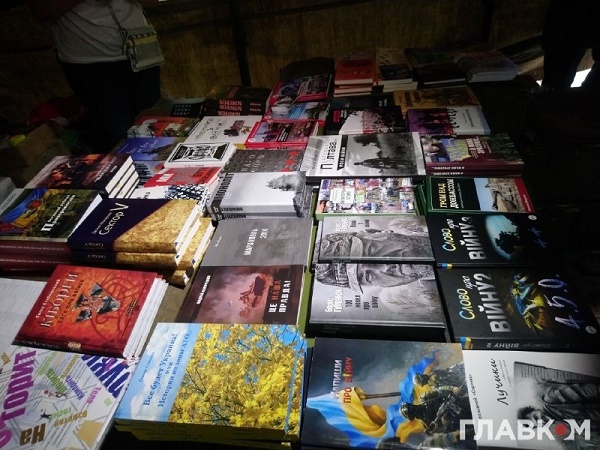I am convinced this theme must become more popular and familiar to the general public. The term “popular” does not have a natural association with the word “war”, but I make an exception in this context because these publications are very relevant and important to read; one ought to know what is happening in the wounded east of our country. The majority of these authors are not professional writers, but soldiers, veterans, individuals who had no involvement with the creation of literature prior to the war. Now, what they have lived, and seen, and felt has burst out through the written word onto the page.
The result of their creative output is an invaluable first-hand treasure of information. It will be important to have it preserved for the next generation, for whom it will be a source for forming a dignified national consciousness and patriotic Ukrainian education. All who live in the peacetime territory of free Ukraine, and who, thankfully, have not seen the war with their own eyes, can be soldiers battling on the information front, reading, analyzing, incorporating these words brought to readers by these authors.
Here is how Vasyl Piddubnyi expresses this idea. Piddubnyi himself is a volunteer fighter, a writer, and editor of the three volume work, A Word About War:
Why veteran’s literature?
1. Writing is a form of stress relief, according to psychologists. We are skeptical of strangers. But with writing, it’s as if you are making all these confessions, but to yourself. By doing so, you are removing an awful weight off your shoulders that had been consuming you all the time you were at war.
2. We are telling the truth, preserving history as it is, without being selective or embellishment. It is not a dry presentation of reports and figures, but rather the living language of emotions. Civilians will be able to learn about what war really is like from our narratives.
3. We awaken the sleepers; one who has “grown tired” of hearing about the war, who doesn’t want to know that we are somewhere out there, and individuals just like us are rotting away in trenches, freezing in damp basements, and dying in the rubble of our shelters. To those we are a reminder that we are still alive, that we are human beings who endure pain and suffering for one reason: that those who claim they are so tired of all this, won’t ever have to witness the reality of war themselves.
4. Whatever has been written has no value unless someone reads it. Do you read about the war? If you do, then every book you buy is like your personal thank you to the author that you can read it in comfort without taking shelter in a basement. It is your contribution to the victory of the information war. It is now your war, because you are standing shoulder to shoulder with the book’s author. The events can remain on the pages of the narrative. But the authors knows intuitively of your support, and is grateful for it.
"We are together in this, and together to the end, to Victory!" says Vasyl Piddubnyi
A listing of the literature dedicated to the events of the war in the Donbas can be found at Wikipedia, in an article, Російсько-українська війна в культурі (The Russo-Ukrainian war in the Cultural Sphere)
Ganna Skorina, with the hashtag #Книги_про_Війну (Books on War) has a comprehensive account on the literature dedicated to the theme of the Russo-Ukrainian war. The list is on her Facebook page.
The books are by soldiers, volunteers who help the military, journalists, internally displaced persons, writers, and other citizens who are concerned about what has happened and who have been affected by the war. These works were published between 2014 and 2018, with an updated list being prepared to include the first half of 2019.
Another great resource is a radio program, Armiya FM, Sektor L, for interviews with authors and others.
This year during the international book fair in Kyiv, Book Arsenal, there was also a Veteran’s Tent, complete with presentations and sales of many different books on the theme of the war. Many readers shared their impressions and photos on Facebook, including comments on the anti-war novel about the events in the East, Tsutsyk by Vitaliy Zapeka, with one commonality: these are the kind of books you definitely need to read!!!
(Tsutsyk belongs to the anti-war genre because people, humanity, the joys of life and the sorrow of losses are told through the eyes of animals who were born during wartime, according to reviewer Iryna Skaskiv_Ed).

